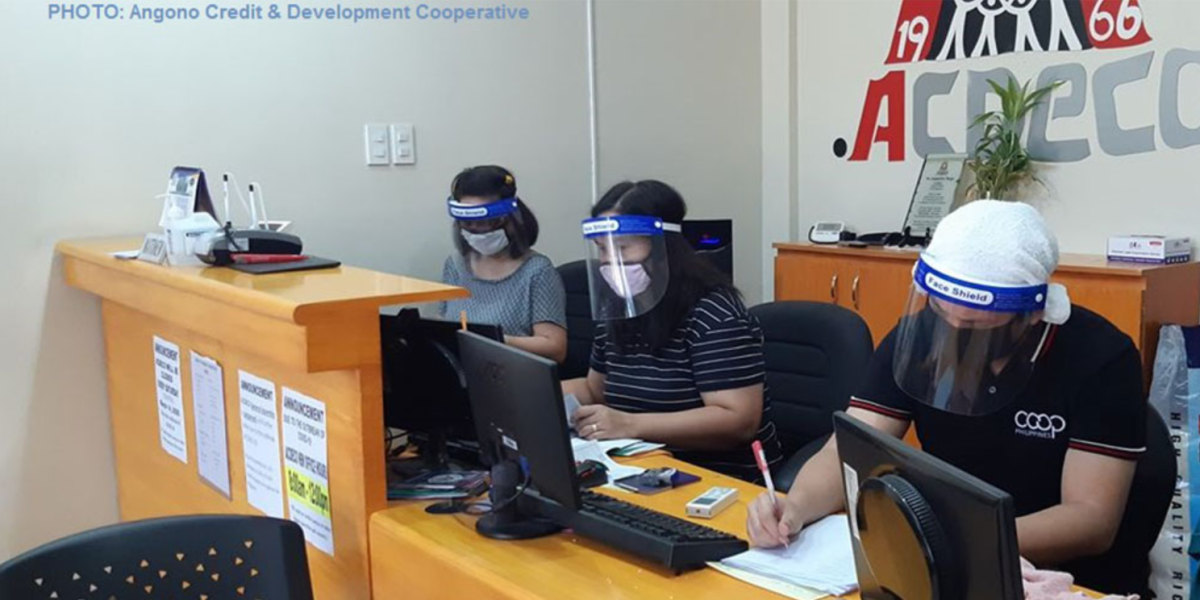Co-ops allowed to operate as essentials businesses
The Government has released the guidelines for Modified Enhanced Community Quarantine (MECQ), where credit co-ops are listed as among the “essential businesses” allowed to operate. The MECQ will start implementation on March 16. It is in line with the World Health Organization’s warning against rushing the lifting of lockdowns in areas with high cases of coronavirus disease 2019 or COVID-19.
The MECQ is more relaxed than ECQ, but has more restrictions compared with the general community quarantine (GCQ).
The co-op sector, led by the Philippine Cooperative Center (PCC) and the COOP-NATCCO Partylist, has lobbied with the national Government to include co-ops in the list of “essential businesses.” Initially, only commercial banks were allowed to operate as essential businesses, while co-op staff were barred from travelling to and from the office.
Co-op leaders all over the country protested that the Bayanihan Heal as One Act of 2020 (Republic Act 11469) Section 4n had expressly said Government will “ensure the availability of credit to the productive sectors of the economy especially in the countryside . . .”
Many co-ops, however, continued with limited service to members through “skeletal workforce” and relying on “digital or online transactions such as KAYA Payment Platform. Many community co-ops also distributed food and grocery items to members, and provided personal protection equipment and food packs to frontliners.
By April 1, the Department of Finance had released the Implementing Rules & Regulations of RA 11469, stating financial institutions regulated by the Cooperative Development Authority were covered as well.
On May 1 the CDA a Memorandum Circular declaring that “credit cooperatives are allowed to work or operate on skeleton workforce in the areas currently under Enhanced Community Quarantine (ECQ), in accordance with Section 2, 4 (g) of the Omnibus Guidelines for the Implementation of Community Quarantine in the Philippines, as approved and recommended by IATF under Resolution No. 30, S. 2020, dated April 29, 2020, and confirmed and adopted under Section 3 of Executive Order No. 112, dated April 30, 2020.”
As of May 14, two days prior to the implementation of MECQ in Metro Manila and surrounding provinces, 401 member co-operatives of the NATCCO Network’s 842 membership were open with limited operations.
This was result of a nationwide survey conducted by NATCCO that began in March.
Most co-ops had also complied with the Bayanihan Act’s provision on “lowering the effective lending rates of interest” in Section 4n, as well as the 4aa provision directing (financial institutions) to implement a 30-day grace period for the payment of all loans . . . without incurring interests, penalties, fees.”
The Presidential Communications Operations Office website said: “Restrictions are still in place under MECQ: People still need to stay at home, limited outdoor exercise are allowed like outdoor walking, jogging, and biking as long as safety protocols are observed, and mass gatherings are still highly restricted (up to 5 persons maximum are allowed).”
All Category I sectors – agriculture, forestry and fisheries; manufacturing of essential goods such as food, hygiene, medicines, medical products and pet food; hospitals and clinics; essential retail such as groceries and drugstores; laundry shops; food preparation, water refilling, logistics service providers; delivery services; utilities such as power and water; repair and installation of machinery and equipment; telecommunications, energy companies, gasoline stations, construction workers accredited to work on health facilities; manufacturing firms and suppliers of construction products and media establishments – are allowed in all quarantine scenarios, including MECQ.
Category II sectors that are allowed under MECQ are cement and steel, mining and quarrying, electronic commerce companies, postal, courier and delivery services, export-oriented companies (point-to-point shuttles); repair of computers and personal and household goods; housing services activities; special purpose accommodation for healthcare workers, overseas Filipino workers, workers in permitted sectors and other people required to undergo quarantine; business process outsourcing, banks, money transfer services, microfinance institutions, pawnshops and credit cooperatives and capital markets.
With reports from www.philstar.com, www.pcoo.gov.ph

